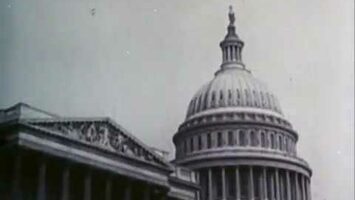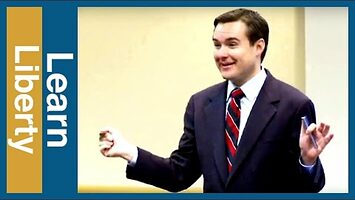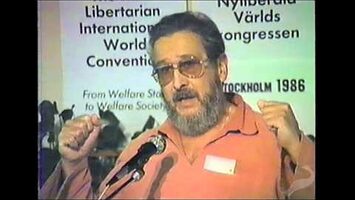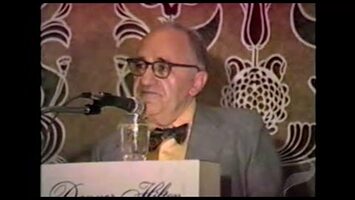Anarchism
Encyclopedia
Max Weber famously defined government as an organization with a geographic monopoly on legitimate coercion. Libertarianism puts severe limits on morally permissible government action. If one takes its strictures seriously, does libertarianism require the abolition of government, logically reducing the position to anarchism? Robert Nozick effectively captures the dilemma: “Individuals have rights, and there are things no person or group may do to them (without violating their rights). So strong and far-reaching are these rights that they raise the question of what, if anything, the state and its officials may do.”
Libertarian political philosophers have extensively debated this question, and many conclude that the answer is “Nothing.” Even a libertarian minimal state is morally prohibited from (a) imposing taxes, or (b) granting itself a legal monopoly. By the standard Weberian definition, any government that respected these strictures would cease to be a government.
In isolation, this conclusion would probably be taken as a reductio ad absurdum of libertarianism. But upon consideration, libertarian economists, most notably Murray Rothbard and David Friedman, concluded that the practical viability of anarchism is underrated: At least once established, so-called anarcho-capitalism would work better in pragmatic terms than a libertarian minimal government.
Libertarians’ interest in anarchism is complicated by anarchism’s historic association with the radical left. The most famous 19th-century anarchists, such as Peter Kropotkin and Michael Bakunin, are routinely described as anarcho-socialists or anarcho-communists. Anarchist mass movements—most famously, the CNT-FAI in pre- Franco Spain—were based on militant anarcho-syndicalist labor unions. Profoundly isolated from mainstream economics, left-wing anarchists rarely explain how their preferred society would function. If they favor voluntary egalitarian socialism, what will they do with people— especially abler people—who opt out? If all must join, does it not follow that a government is necessary to enforce participation? If people get to choose their commune, would not inequality reemerge among the more and less prosperous communes?
The territory controlled by anarchists during the Spanish Civil War elegantly illustrates these dilemmas. In the cities, anarchist workers took over their places of employment. However, because membership was voluntary, abler members demanded unequal shares, and workplaces with high capital-labor ratios refused to share. As many anarchosocialists lamented, capitalism spontaneously reemerged. In contrast, in the country, anarchism took an Orwellian turn. Anarchist revolutionaries imposed forced collectivization at gunpoint, with—at best—token rights to opt out, producing small-scale Stalinism in all but name.
Despite anarcho-socialists’ denials, anarcho-capitalism has 19th-century antecedents. The most clear-cut example is Belgian economist Gustave de Molinari, whose controversial 1849 article, “The Production of Security,” forcefully argued “that no government should have the right to prevent another government from going into competition with it, or to require consumers of security to come exclusively to it for this commodity.” Individualist anarchists, especially Lysander Spooner and Benjamin Tucker, likewise maintained that the free market could and should take over the functions of the nightwatchman state. Spooner and Tucker held stereotypically socialist economic theories about interest, rent, and wages, but insisted that laissez-faire was the solution for these supposed evils, not their cause. It was primarily Murray Rothbard and David Friedman, however, who rescued anarcho-capitalism from modern obscurity. In their respective 1973 classics, For a New Liberty and The Machinery of Freedom, they laid the groundwork for modern anarcho-capitalist literature. Almost all anarcho-capitalists were at one point advocates of a libertarian minimal or nightwatchman state, in which government limits itself to the monopolistic provision of police, courts, criminal punishment, and national defense. The easiest way to grasp the anarcho-capitalist position is to start with the minimal state and then imagine what would happen if the free market absorbed its remaining functions.
A government police force supported by taxes would be replaced by police firms supported by paying customers. When disputes arose, police firms would turn to private courts for adjudication. Private courts, in turn, would strive to attract more subscribers by crafting judge-made law to prevent disputes from arising in the first place. Many rulings would be enforced by ostracism, bonding, or other nonviolent means. However, for violent offenders with few liquid resources, it would probably be necessary to have a private prison industry to extract restitution.
Anarcho-capitalism is often dismissed as utopian, but Rothbard rejects the charge: “In contrast to such utopians as Marxists or left-wing anarchists … libertarians do not assume that the ushering in of the purely free society of their dreams will also bring with it a new, magically transformed Libertarian Man.” Indeed, anarcho-capitalists are deeply concerned about what economists call incentive compatibility: Would private firms in a defense services industry find it in their self-interest to behave as described?
Anarcho-capitalists predictably identify competition and reputation as the mechanisms that link selfish motives and socially beneficial results. Why would police firms do a good job for a reasonable price? If they fail, consumers would switch to a competitor. If Client A of Firm X accuses Client B of Firm Y and infringing his rights and B denies the charge, what would happen? A shoot-out between X and Y is possible, but unlikely. It would be more profitable for both sides to negotiate rather than fight. After all, the policemen work voluntarily and would have to be paid far more if bloodshed were a daily occurrence. In fact, business leaders would predict that such problems would likely occur and write contracts to handle them before they arose. Why would police agencies turn to a judge instead of defending their clients to the death? Agencies pursuing this strategy would counterproductively attract the high-risk clients. Why would judges give honest rulings instead of selling themselves to the highest bidder? A judge with a reputation for corruption would find it difficult to attract clients. How would one extract restitution from an indigent criminal? Convicted criminals would be sold to private prisons as indentured servants and released after they paid off their debt. Why would private prisons treat inmates humanely? Because a safe and healthy indentured servant is a productive indentured servant.
Even many libertarians find anarcho-capitalism outlandish and frightening. Therefore, it is worth pointing out that the market already plays a larger role in the defense services industry than is generally recognized. There are currently more security guards in the United States than government police. In many respects, private arbitration now resolves more disputes than the public courts. The market has created an array of nonviolent punishments— from credit reports to bonding to eBay feedback ratings— to deter offenses the government fails to prosecute. Despite the private sector’s large current role in the defense services industry, dangerous side effects have yet to materialize.
Even libertarians are often given to hasty rejection of anarcho-capitalism. Ayn Rand, to take the most famous example, asserted that warfare would erupt as soon as the client of one police firm became embroiled with the client of another police firm. She did not explain why profitmaximizing businesses would prefer bloodshed to arbitration. The young Roy Childs won notoriety in libertarian circles by pointing out the internal inconsistencies of her critique of anarchism in his “Open Letter to Ayn Rand.”
Critics are on firmer ground when they doubt the ability of the free market to repel foreign invaders. How would it be in anyone’s financial interest to shoulder this burden? Standard economics suggests that defense is a public good; competing firms would free ride off the efforts of others, leading to a suboptimal supply. Austrian economists like Murray Rothbard unconvincingly reject this conclusion on methodological grounds. David Friedman has a less ideological response. Friedman agrees that defense against foreign invaders is a public good. However, the total cost of this public good is only a fraction of the current level of charitable giving. It is not unrealistic to suggest that national defense could be funded by redirecting existing charitable impulses. Many would also add that even if a tax-funded minimal government is better equipped to repel foreign aggressors, it also is more likely to engage in foreign aggression, provoke foreign attacks, or stage a coup d’état against domestic liberty.
Libertarians are normally skeptical about the extent and effectiveness of business conspiracies to push prices above the competitive level. These conspiracies are plagued by an array of difficulties—most fundamentally, new entry. However, this risk seems markedly greater in the market for defense services. A cartel of defense firms might collude to raise prices and then short-circuit the market’s usual checks by threatening to attack new entrants who dare to undermine the agreement.
Is this possible? Yes, but is it likely? That depends on the equilibrium number of firms in the industry. As David Friedman puts it, “If there are only two or three agencies in the entire area now covered by the United States, a conspiracy among them may be practical. If there are 10,000, then when any group of them starts acting like a government, their customers will hire someone else to protect them against their protectors.” The number of firms, in turn, depends on the level of demand and the extent of scale economies. If demand is low and scale economies are substantial, there might only be a couple of rival police firms, just as a small town sustains only a couple of grocery stores. But neither of these conditions is likely to hold in the defense services industry. Physical security is not a niche product; almost everyone would want to buy some, so overall demand for defense services would be fairly high. Although we must extrapolate with caution, the existing security industry does not exhibit substantial scale economies. Because privatization would sharply increase demand, a privatized police industry would probably be even more atomistic than it currently is.
Tyler Cowen advances a novel variation on the collusion theme. According to Cowen, defense services is a network industry, the defining characteristic of which is that competing firms must cooperate with each other to deliver an attractive product. For example, MCI competes with AT&T, but they also cooperatively interconnect their systems so MCI’s customers can call AT&T’s, and vice versa. If MCI users were only able to dial other MCI users, their phone service would be far less valuable. By the same logic, competing defense firms would want to interconnect so customers of Firm X could peacefully resolve disputes with customers of Firm Y.
In Cowen’s view, this scenario gives rise to a special dilemma. If transaction costs are low enough to allow firms to interconnect, they also would probably be low enough to allow firms to cheaply collude to seize power. However, if transaction costs are too high for collusion, they also would prevent interconnection, leading to chaos and warfare. Either way, then, anarcho-capitalism will not work well. Cowen’s thesis has been criticized for ignoring the fact that—in contrast to collusion—there is no incentive to cheat on an interconnection agreement.
In Anarchy, State, and Utopia (1974), the most famous modern work of libertarian political philosophy, Robert Nozick argues against the anarcho-capitalists that a minimal state could arise without violating libertarian rights. He begins by assuming that economies of scale in the defense services industry are so large that a single dominant firm would naturally emerge from the competitive process. This firm would then have the power to ban competing firms. More important, from a philosophical standpoint, Nozick maintains that the dominant firm would have the right to do so because rival judicial procedures would impose an illegitimate risk on the dominant firm’s clients. Finally, Nozick maintains that the dominant firm would be morally obliged to compensate individuals who lose as a result of the ban, and the most natural form of compensation would be free defense services.
Anarcho-capitalists have heavily criticized every step in Nozick’s thesis. Descriptively, Nozick provides little evidence of significant economies of scale. Normatively, Nozick’s critics deny that a dominant firm could justifiably ban rivals merely because it felt that their procedures were too risky. At minimum, the dominant firm could not put its rivals out of business if they were to mimic the dominant firm’s own procedural safeguards. Furthermore, if a ban is justified to protect individual rights, there is no obligation to compensate those who lose as a result. Above all else, actual states did not arise in Nozick’s rights-respecting manner, so, as Murray Rothbard put it, “it is incumbent upon Nozick to join anarchists in calling for the abolition of all States, and then to sit back and wait for his alleged invisible hand to operate.” Although dissenters remain, the consensus view of anarcho-capitalism held by libertarian scholars can be fairly summarized.
First, it is impossible to reconcile the minimal state with morally absolute individual rights. In terms of rights theory, only the anarcho-capitalist position is internally consistent. However, libertarians have become increasingly reluctant to embrace theories of absolute individual rights; in philosophical terms, consequentialism has gained considerably over deontology.
Second, there is at least a moderate risk that an anarchocapitalist experiment would have poor consequences. Although it is more likely to be practically viable than usually believed, predictions about anarcho-capitalism’s performance remain speculative. All we have are isolated historical examples, most notably David Friedman’s account of medieval Iceland. Nevertheless, the modern industries of security, arbitration, credit rating, and the like could plainly play a much larger role without in any way endangering civilization. As these industries expand, it should be possible to slowly and safely learn whether anarchocapitalists’ optimism is justified.
Further Readings
Benson, Bruce. The Enterprise of Law: Justice without the State. San Francisco: Pacific Research Institute for Public Policy, 1990.
———. To Serve and Protect: Privatization and Community in Criminal Justice. New York: New York University Press, 1998.
Bolloten, Burnett. The Spanish Civil War: Revolution and Counterrevolution. Chapel Hill: University of North Carolina Press, 1991.
Caplan, Bryan, and Edward Stringham. “Networks, Law, and the Paradox of Cooperation.” Review of Austrian Economics 16 (2003): 309–326.
Childs, Roy. “The Invisible Hand Strikes Back.” Journal of Libertarian Studies 1 (1977): 23–33.
———. “Objectivism and the State: An Open Letter to Ayn Rand.” Liberty Against Power: Essays by Roy A. Childs, Jr. San Francisco: Fox and Wilkes, 1994. 145–156.
Cowen, Tyler. “Law as a Public Good: The Economics of Anarchy.” Economics and Philosophy 10 (1992): 249–267.
Friedman, David. The Machinery of Freedom: Guide to a Radical Capitalism. LaSalle, IL: Open Court, 1989.
Molinari, Gustave de. “The Production of Security.” New York: The Center for Libertarian Studies, 1979.
Nozick, Robert. Anarchy, State, and Utopia. New York: Basic Books, 1974.
Rand, Ayn. “The Nature of Government.” In The Virtue of Selfishness: A New Concept of Egoism. New York: Signet, 1964. 107–115.
Rothbard, Murray. Man, Economy, and State. Los Angeles: Nash Publishing, 1962.
———. “Robert Nozick and the Immaculate Conception of the State.” Journal of Libertarian Studies 1 (1977): 45–57.
Minarchists and Anarchists in Libertarian History, written by David S. D’Amato
Robert Anton Wilson: Mildly Puzzled All the Time, written by David S. D’Amato
Federalism in Proudhon and Ostrom, written by David S. D’Amato

























